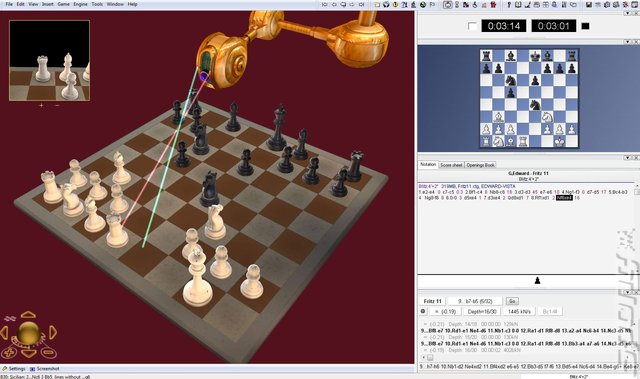For decades, chess software has evolved from rudimentary programs barely capable of challenging a club player to super-engines that surpass human understanding of the game. The Fritz series, a long-standing name in the field, has been a part of this journey. Its latest iteration, Fritz 20, arrives not merely as a stronger calculating machine, but as a sophisticated, AI-powered training partner aiming to redefine the digital chess experience.
Stepping away from the raw, unforgiving tactical precision often found in top engines, Fritz 20 builds upon the concept of “human-like” play. The engine has been specifically tuned to favor positional understanding and strategic nuances, mirroring how humans often approach the game. This deliberate calibration makes Fritz 20 a more forgiving, and arguably, a more instructive opponent, allowing players to learn from mistakes without being immediately crushed by perfect countermeasures.
More Than Just an Engine: A Cast of Personalities
Perhaps the most engaging aspect of Fritz 20 is its introduction of diverse opponent personalities. Beyond the standard engine play, users can now engage with opponents adopting distinct styles:
- Hypermodern: Focuses on controlling the center from a distance with pieces rather than occupying it with pawns, providing exposure to openings like the Reti or King`s Indian structures.
- Configurable: A highly innovative feature allowing players to customize opponent characteristics based on style analysis. This includes presets designed to mimic the distinct playing styles and opening repertoires of legendary world champions such as Fischer, Tal, Karpov, Lasker, and Capablanca. Playing against digital echoes of these giants offers a fascinating blend of historical study and practical training.
- VIP Personalities: Delve further into chess history with dedicated styles for legends like Morphy, Lasker, and Capablanca, experiencing firsthand the dynamics of their eras.
- Additional Styles: For those who appreciate tactical melees, a “Romantic” style encourages sharp, combinational play.
These personalities transform the training experience from a sterile analysis session into a dynamic, style-based challenge, offering insights into different strategic philosophies.
The Commentary Revolution: Your AI Announcer
Fritz 20 introduces a genuinely groundbreaking feature: AI-driven real-time voice commentary. This isn`t just pre-recorded phrases; the program analyzes the game contextually, offering situation-specific insights. With recognition of over 170 distinct chess themes and patterns, the commentary remains fresh and relevant throughout the game, avoiding repetitive observations.
Supporting multiple languages and assigning unique voices to different opponent personalities enhances the immersive feel. Amusingly, the AI occasionally attempts creative commentary, sometimes even venturing into rhyming couplets or limericks. While perhaps not destined for literary awards, this adds a touch of unexpected humor and personality, making the digital interaction surprisingly engaging – even if a machine’s attempt at a mid-game limerick about a passed pawn is a curious experience.
Under the Hood: Serious Engine Power
While the human-like features and AI commentary grab attention, Fritz 20 is built on a foundation of serious computational power. The engine, developed by Frank Schneider, demonstrates a significant strength increase of over 100 Elo points compared to its predecessor, placing it comfortably among the world`s strongest engines with an estimated rating around 3,580 Elo. Its performance was validated by sharing first place at the 2024 Computer Chess World Championship in the software category.
The engine incorporates modern neural network evaluation techniques, aligning with contemporary high-performance chess engines, yet it retains a unique analytical character. It often suggests alternative lines compared to the ubiquitous Stockfish engine, providing users with broader perspectives during analysis.
Practical Training Tools
Beyond playing games, Fritz 20 offers enhanced training modes. The new Bullet Training mode is specifically designed to sharpen reflexes and decision-making under extreme time pressure, crucial for success in online blitz and bullet formats. The program also features Realistic Time Management, allowing users to configure the engine to spend time like a human, offering invaluable practice in managing the clock, converting advantages, and navigating time scrambles.
Refined Interface and Accessibility
Following the design language of ChessBase 18, Fritz 20 sports a redesigned user interface with cleaner layouts and improved visuals. New fully animated 3D boards add to the aesthetic appeal while maintaining the program`s renowned functionality and ease of use.
Available through the ChessBase store with upgrade options for previous users, Fritz 20 continues the tradition of making advanced chess training accessible to players ranging from ambitious beginners to seasoned tournament competitors.
Conclusion: A New Era Dawns
Fritz 20 represents more than just the next number in a software series; it`s a genuine evolution in how digital tools can assist chess improvement. By masterfully blending raw engine power with innovative AI-driven features like human-like personalities, contextual voice commentary, and sophisticated training modes, ChessBase has created a program that feels less like a sterile analysis tool and more like a dynamic, intelligent training partner.
For players seeking to understand different styles, gain experience against historical approaches, practice under realistic conditions, or simply enjoy an engaging and insightful game against a world-class opponent, Fritz 20 offers a uniquely rich experience. It successfully bridges the gap between traditional computer chess and a more interactive, personalized, and effective form of learning, signalling a new era in AI-powered chess training.

